#Diabetes and Mental Health
Explore tagged Tumblr posts
Text
Diabetes and Mental Health Understanding the Connection Among Depression and Diabetes
Diabetes and mental health are closely linked, yet often not talked about. Diabetes is a common health condition in India, and managing it can be challenging. But when combined with depression, the situation becomes even harder. Many people with diabetes also experience depression, making it difficult to maintain a healthy lifestyle. Dr. Pratibha Bezwada, a leading psychiatrist in Pune, specializes in helping patients manage depression, including those living with diabetes. Managing Diabetes and mental health often go hand in hand. Living with diabetes requires constant monitoring of blood sugar levels, sticking to a healthy diet, and managing stress. These responsibilities can sometimes feel overwhelming, leading to depression.Depression, on the other hand, can make it harder to take care of oneself, which can worsen diabetes. This creates a vicious cycle that affects both physical and mental health.
Symptoms of Depression in Diabetes:
It is essential to identify the symptoms of depression in people with diabetes. These can include:
Persistent sadness or feeling low.
Loss of interest in activities once enjoyed.
Fatigue or lack of energy.
Changes in appetite or weight.
Difficulty sleeping or sleeping too much.
Difficulty concentrating.
Feeling hopeless or worthless.
If you or someone you know is experiencing these symptoms, consulting an expert like Dr. Pratibha Bezwada in Pune can help.
Does Diabetes Cause Depression?
Research shows that people with diabetes are more likely to experience depression. Some reasons include:
The stress of managing a chronic illness.
Fluctuating blood sugar levels affecting mood.
Physical and emotional exhaustion from long-term health management.
Dr. Pratibha Bezwada explains that Managing diabetes and mental health does not directly cause depression but increases the risk due to the mental and physical demands it places on individuals.
Does Depression Worsen Diabetes?
Yes, depression can make diabetes worse. When a person is depressed, they may struggle with:
Following a proper diet plan.
Taking medications on time.
Exercising regularly.
Monitoring blood sugar levels.
This can lead to poor diabetes control, increasing the risk of complications like heart disease or nerve damage.
Treatment of Depression With Diabetes:
Managing Managing diabetes and mental health requires a holistic approach. Here’s how it can be done:
Psychiatric Support: Seeking help from a qualified psychiatrist like Pratibha Bezwada can make a big difference.
Counseling and Therapy: Talking to a professional can help deal with the emotional burden of diabetes.
Medication: In some cases, antidepressants might be needed to improve mental health.
Lifestyle Changes: Practicing mindfulness, staying active, and eating balanced meals can help manage both conditions.
How Dr. Pratibha Bezwada Helps to Manage Depression?
Dr. Pratibha Bezwada, a renowned psychiatrist in Hinjewadi, Pune, has years of experience helping patients manage depression and mental health challenges. She provides personalized care, understanding that each patient’s journey with diabetes and depression is unique.
Her treatment involves:
Comprehensive evaluations to understand the connection between diabetes and depression.
Tailored therapies to address emotional challenges.
Guidance on maintaining a balanced lifestyle to manage both diabetes and mental health effectively.
Her clinic in Pune is a trusted place for those seeking professional help for depression. Dr. Pratibha Bezwada’s patient-first approach ensures that every individual gets the support they need.
Conclusion:
Living with diabetes and depression can feel overwhelming, but you don’t have to face it alone. At Livwell Happier Minds Mental Health Centre, Dr. Pratibha Bezwada offers personalized care to help you regain control of your health and happiness. With expert counseling and proven treatment strategies, we’re here to support your journey. Take the first step today — book your appointment now and start living a better tomorrow!
0 notes
Link
Diabetics Support Site: Join us to take control of your health!
#Diabetics Support Site: Join us to take control of your health!#diabetes#diabetes ayurvedic treatment bangalore#diabetes care devices market#diabetes and mental health#blood sugar#blood sugar control
0 notes
Text

#trump#donald trump#democrats#president trump#healthy#health and wellness#mental health#healthcare#health & fitness#healthylifestyle#fitness#rfkjr#gymlife#gym#weight loss diet#diet#workout#weight loss#diabetes#blood pressure#fat girls#foodporn#foodie#food#food porn#food photography#trump 2024#muscle#keto#counting calories
29 notes
·
View notes
Text









Horrendously, wonderfully relatable
#brennan lee mulligan#dimension 20#fantasy high sophomore year#quote#ragh barkrock#diabetes stuff#therapy#mental health#relatable content
29 notes
·
View notes
Text
Take Control: Managing Elevated Blood Sugar Levels with Diabetes
Living with diabetes can feel like riding a roller coaster. Sometimes you're up, and other times, you're just trying to hold on. Elevated blood sugar levels can lead to complications, but managing them doesn’t have to be overwhelming. Let’s break it down into simple steps that make sense.
Understanding Elevated Blood Sugar Levels
When you eat, your body breaks down food into glucose, which is the fuel your cells need. Insulin, a hormone produced by the pancreas, helps move that glucose into your cells. In diabetes, this system doesn’t work quite like it should. This can leave too much sugar lingering in your bloodstream. Think of it like a traffic jam; instead of flowing smoothly, everything's backed up and causing problems.
Recognizing the Signs
Ever felt unusually thirsty or tired? Maybe you've noticed frequent trips to the bathroom? Those can all be signs your blood sugar is too high. Other signals might include blurred vision or headaches. Paying attention to your body is key. It's like having a built-in alarm system; you just need to know how to listen.
Smart Eating Habits
Your diet plays a significant role in managing your blood sugar. Focus on whole foods that nourish your body. Think fruits, veggies, lean proteins, and whole grains. Picture your plate as a colorful palette. The more colors you have, the more nutrients you’re getting! Try to balance your meals with carbs, proteins, and fats to keep your blood sugar steady.
Regular Exercise: Your Secret Weapon
Let’s talk about exercise – it’s not just for fitness buffs or sports enthusiasts. Moving your body helps your cells use insulin more effectively. Just 30 minutes of walking, biking, or dancing can be a game changer. Think of exercise like a key; it opens the door for glucose to enter your cells. Plus, it lifts your mood and boosts your energy levels.
Monitoring Your Blood Sugar
Keeping an eye on your blood sugar numbers is crucial. Regular testing gives you a clear picture of how your food choices and activities impact your levels. Over time, you’ll start to notice patterns. Maybe you find out a certain snack pushes your numbers up. This knowledge is empowering, like having a roadmap in your back pocket.
Managing Stress: The Silent Saboteur
Stress can sneak in and cause your blood sugar to spike. It’s like an unexpected guest that makes everything chaotic. Stress triggers your body to release hormones that can raise blood sugar. Finding outlets like deep breathing, yoga, or even enjoying a hobby can help keep your stress in check. Think of these activities as a calm oasis amid a busy desert.
The Importance of Medication
Sometimes, lifestyle changes aren’t enough on their own. If your doctor has prescribed medication, it’s essential to take it as directed. Medications can help bridge the gap between what your body needs and what it can produce. Think of medication as a protective shield, safeguarding you from potential complications.
Building a Support System
You're not alone on this journey. Building a support system is vital. This can include friends, family, or join local support groups. Talking about your experience helps lighten the load. It’s like having a team behind you at a big game, cheering you on every step of the way.
Conclusion: Your Path Forward
Managing elevated blood sugar levels with diabetes doesn’t have to feel daunting. By learning about your body, making smart food choices, staying active, and seeking support, you can take significant steps towards better health. Remember, each small change adds up, and you have the power to shape your journey. Embrace this path and take control of your health today!
#diabetes#diabetescommunity#gestational diabetes#health and wellness#healthcare#type 1 diabetes#type 2 diabetes#wellnessjourney#north carolina#usa#mens health and fitness#health and fitness tips#healthy eating#health & fitness#health fitness food#healthy foods#health fitness#healthylifestyle#nutrition#wellness#mental health#treatment
35 notes
·
View notes
Text
Hi! I’m a chronically ill design student studying the experiences of people with chronic health conditions interacting with primary care If anyone would like to take my survey that would be great!
#spoonie#chronic illness#chronically ill#mental health#neurodivergent#pots#elhers danlos syndrome#chronic fatigue#adhd#autism#fibromyalgia#mast cell activation syndrome#chronic pain#invisible illness#sickle cell disease#diabetes
64 notes
·
View notes
Text
If you made a mistake (or two or five or hundreds) in your medical care, you are still a good person. You still deserve care, you still deserve to feel better 💙
#teaandspoons#disability#chronic illness#spoonie#chronic pain#chronic fatigue#food allergies#celiac disease#mast cell activation syndrome#pots#dysautonomia#mental health#diabetes#adrenal insufficiency
35 notes
·
View notes
Text
we have hit a wall
and i have given everything i have
i have sacrificed my life for this body
and she hates me
she closes her eyes and holds her breath
she refuses the antidote
i tell her to breathe
i try to save her life
and she bleeds after each injection
she only wants illness
and a stick to hold her body upright
she wants pain
and she is all too confused
her brain stunts any currents
yet all mine thinks of is her
i devote all my days to her fire
and she waters it in an instant
i love her more than the ground i stand on
and she breaks my legs
i don't know how to keep loving her
i know her too well
i know her tricks
and her warmth
and i know there is no escaping her
she is my entire being
and i am her greatest knave
i once read a poem
of self worth
said to cherish your own loyalty
because you are the only one
who cannot and will not leave
i believed it when i read it
but who would she be
if not my own worst enemy
i feel her constant nagging
she relentlessly begs me to let go
my loving words never falter
she will never love me until i am done
and i cannot quit until she does
we have hit a wall
and all she does is lock the doors i build
to go out
#female writers#writers on tumblr#poets on tumblr#poetry#writeblr#writers and poets#writerscommunity#my writing#out of my collection#chronic illness#chronically ill#brain disease#epilepsy#fnd#gastroparesis#type one diabetes#mental health#my brain#my worst enemy#my own worst enemy
9 notes
·
View notes
Text


today is the first day in a couple of weeks I’ve been able to do stuff and it not be because I have a medical appointment so here are some of my Christmas decorations
#I think I bossed my ecg yesterday#the nurse said if there was anything out of the ordinary then the paramedic who checks them would call#and they haven’t so??????#but I’ve gotta have another blood test after Christmas bc suspected diabetes#I’m feeling a bit better and my mental health isn’t so precarious now
8 notes
·
View notes
Text
National Eating Disorder Awareness Week - Diabulimia
CW // Disordered eating
(click for better quality)
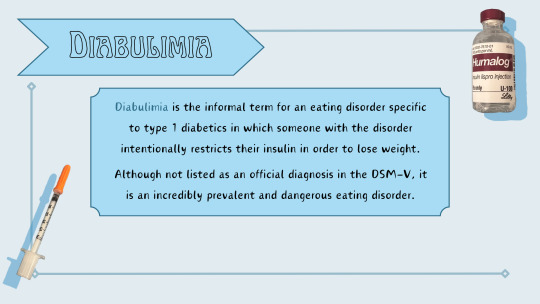
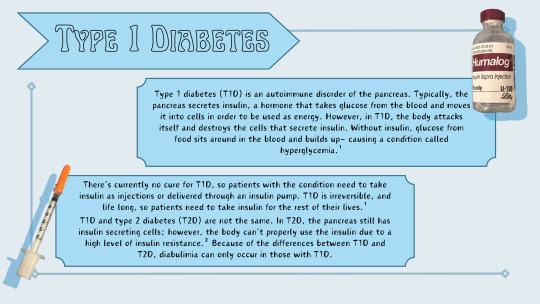
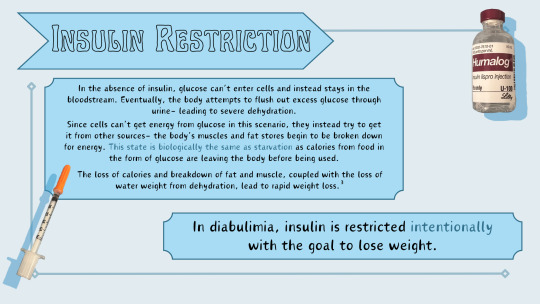

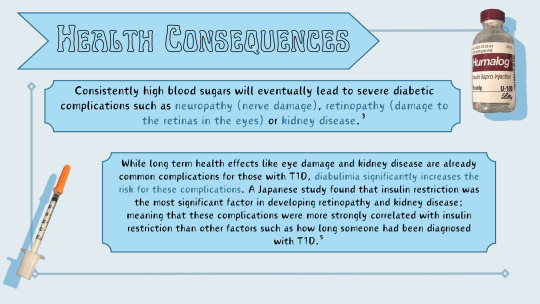


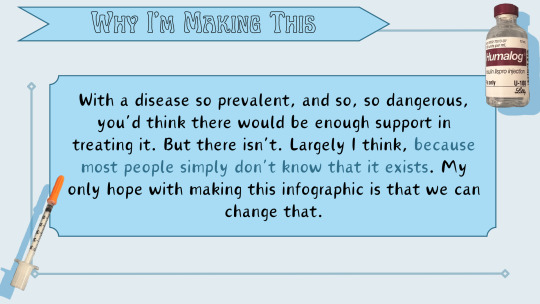
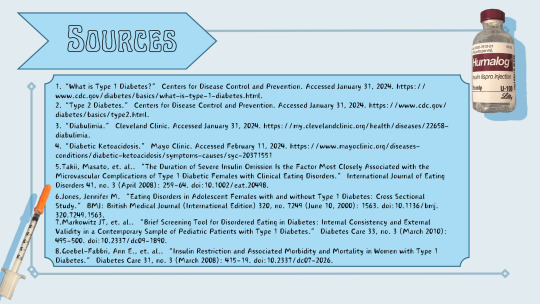
Transcript Below
Diabulimia- Diabulimia is the informal term for an eating disorder specific to type 1 diabetics in which someone with the disorder intentionally restricts their insulin in order to lose weight. Although not listed as an official diagnosis in the DSM-V, it is an incredibly prevalent and dangerous eating disorder.
Type 1 Diabetes- Type 1 diabetes (T1D) is an autoimmune disorder of the pancreas. Typically, the pancreas secretes insulin, a hormone that takes glucose from the blood and moves it into cells in order to be used as energy. However, in T1D, the body attacks itself and destroys the cells that secrete insulin. Without insulin, glucose from food sits around in the blood and builds up– causing a condition called hyperglycemia.¹ There’s currently no cure for T1D, so patients with the condition need to take insulin as injections or delivered through an insulin pump. T1D is irreversible, and life long, so patients need to take insulin for the rest of their lives.¹ T1D and type 2 diabetes (T2D) are not the same. In T2D, the pancreas still has insulin secreting cells; however, the body can’t properly use the insulin due to a high level of insulin resistance.² Because of the differences between T1D and T2D, diabulimia can only occur in those with T1D.
Insulin Restriction- In the absence of insulin, glucose can’t enter cells and instead stays in the bloodstream. Eventually, the body attempts to flush out excess glucose through urine– leading to severe dehydration. Since cells can’t get energy from glucose in this scenario, they instead try to get it from other sources– the body’s muscles and fat stores begin to be broken down for energy. This state is biologically the same as starvation as calories from food in the form of glucose are leaving the body before being used. The loss of calories and breakdown of fat and muscle, coupled with the loss of water weight from dehydration, lead to rapid weight loss.³ In diabulimia, insulin is restricted intentionally with the goal to lose weight.
DKA- In the short term, diabulimia leads to frequent urination and severe dehydration, immense fatigue and nausea and vomiting.³ If left untreated, these high blood sugars will eventually lead to a condition called Diabetic Ketoacidosis (DKA). DKA occurs when fat is broken down in the body. The breakdown of fat releases acidic compounds called ketones. Eventually, with enough build up of ketones, the blood itself becomes acidic and may eventually lead to coma or death.⁴ DKA must be treated in a hospital setting; and as such, is often the way that diabulimics are first treated for their eating disorders.
Health Consequences- Consistently high blood sugars will eventually lead to severe diabetic complications such as neuropathy (nerve damage), retinopathy (damage to the retinas in the eyes) or kidney disease.³ While long term health effects like eye damage and kidney disease are already common complications for those with T1D, diabulimia significantly increases the risk for these complications. A Japanese study found that insulin restriction was the most significant factor in developing retinopathy and kidney disease; meaning that these complications were more strongly correlated with insulin restriction than other factors such as how long someone had been diagnosed with T1D.⁵
Prevalence and Risk- When compared to girls without T1D, those in the same age range that were diagnosed with T1D were around 2.4 times more likely to have an eating disorder ⁶ One study that surveyed 112 teens with T1D found that around 27% restricted insulin dosages ⁷ An 11-year study found that those with T1D who restricted insulin had a risk of death 3.2 times higher than diabetics who did not ⁸
Why I'm Making This- Accessing treatment for diabulimia is incredibly difficult. When I first began to look for inpatient eating disorder treatment, I was turned down from every residential and inpatient facility in my state. The only reason I got into a residential that time was because my mom is a very determined and very convincing woman (she threatened to sue them). And that isn’t even accounting for the lack of diabulimia specific treatment. My last time in treatment, the hospital I was at recommended I enter inpatient; however, there ended up being only a few inpatient centers with diabulimia experience in my country-- the closest one rejected me because they couldn’t find an endocrinologist to oversee my diabetes care. This lack of treatment is especially dangerous with how severe the health consequences of diabulimia are. In fact, since beginning work on this infographic, I found out I may have kidney damage. Yes, as a result of diabulimia. I also have permanent eye damage, neuropathy, and I’m finally (3 months after leaving the hospital) recovering from the short term health consequences of my disorder. And even I am luckier than a lot of other diabulimics. With a disease so prevalent, and so, so dangerous, you’d think there would be enough support in treating it. But there isn’t. Largely I think, because most people simply don’t know that it exists. My only hope with making this infographic is that we can change that.
Sources:
1- “What is Type 1 Diabetes?” Centers for Disease Control and Prevention. Accessed January 31, 2024. https://www.cdc.gov/diabetes/basics/what-is-type-1-diabetes.html.
2- “Type 2 Diabetes.” Centers for Disease Control and Prevention. Accessed January 31, 2024. https://www.cdc.gov/diabetes/basics/type2.html.
3- “Diabulimia.” Cleveland Clinic. Accessed January 31, 2024. https://my.clevelandclinic.org/health/diseases/22658-diabulimia.
4- “Diabetic Ketoacidosis.” Mayo Clinic. Accessed February 11, 2024. https://www.mayoclinic.org/diseases-conditions/diabetic-ketoacidosis/symptoms-causes/syc-20371551
5- Takii, Masato, et. al.. “The Duration of Severe Insulin Omission Is the Factor Most Closely Associated with the Microvascular Complications of Type 1 Diabetic Females with Clinical Eating Disorders.” International Journal of Eating Disorders 41, no. 3 (April 2008): 259–64. doi:10.1002/eat.20498.
6- Jones, Jennifer M. “Eating Disorders in Adolescent Females with and without Type 1 Diabetes: Cross Sectional Study.” BMJ: British Medical Journal (International Edition) 320, no. 7249 (June 10, 2000): 1563. doi:10.1136/bmj.320.7249.1563.
7- Markowitz JT, et. al.. “Brief Screening Tool for Disordered Eating in Diabetes: Internal Consistency and External Validity in a Contemporary Sample of Pediatric Patients with Type 1 Diabetes.” Diabetes Care 33, no. 3 (March 2010): 495–500. doi:10.2337/dc09-1890.
8- Goebel-Fabbri, Ann E., et. al.. “Insulin Restriction and Associated Morbidity and Mortality in Women with Type 1 Diabetes.” Diabetes Care 31, no. 3 (March 2008): 415–19. doi:10.2337/dc07-2026.
#type 1 diabetes#type 1 diabetic#diabulimia#national eating disorder awareness week#neda#eating disorder recovery#diabulimia recovery#mental health#mental health awareness#national eating disorder awareness#diabetes#i tried to make it like an infographic but i write too much and so it's more like a powerpoint... oops...#anyways idk i just wanted more info about this to be out here so i made this#please reblog it would mean a lot <3#zelle.txt
19 notes
·
View notes
Text

#self care#self love#being human#physical health#mental health#women’s health#trying my best#one day at a time#health conditions#invisible illness#mental illness#physical illness#diabetes#diabetes type 2#sleep apnea#anxiety disorder#bipolar disorder#bipolar type 2#adulting#getting older#trying my hardest#christian blog#christian tumblr
10 notes
·
View notes
Text







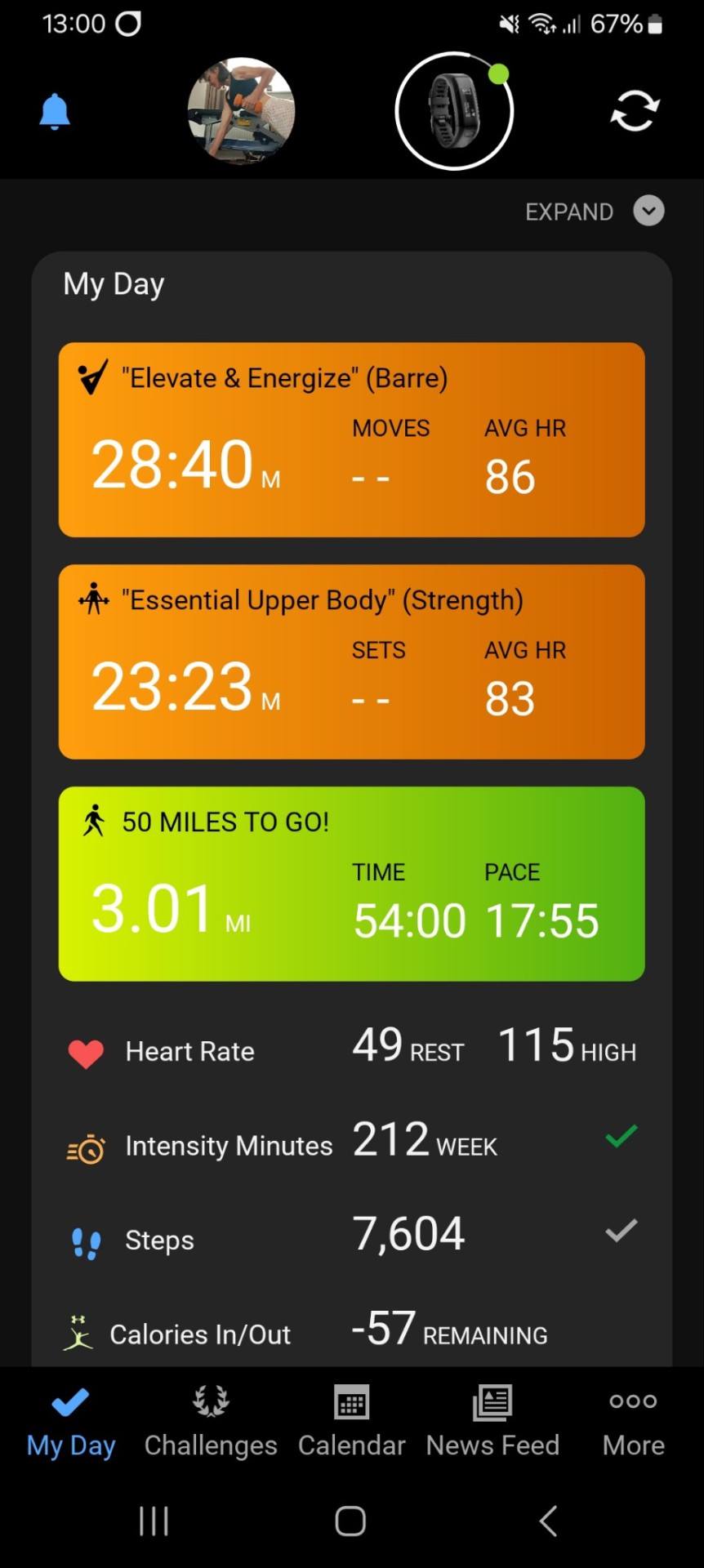
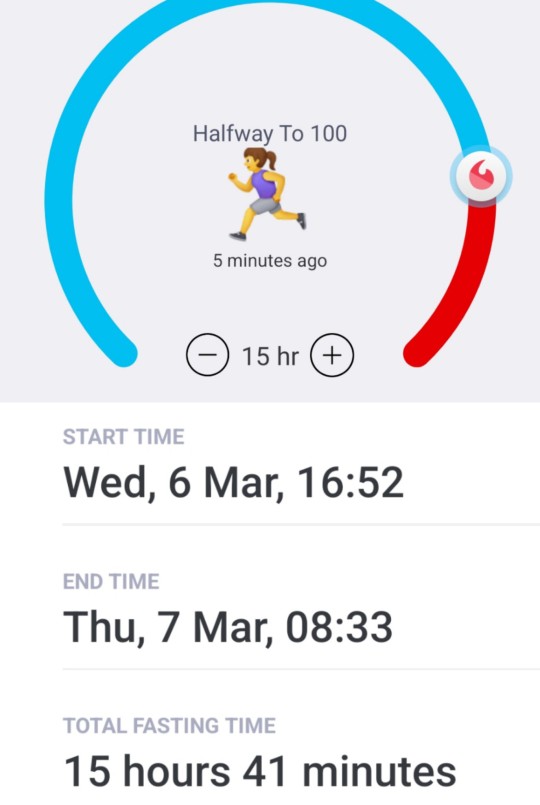

Hmm, ok. I think it's finally time to accept that I have to stay peanut free. Any format. They need to go.
Anyhoo....Not gonna cry about it. It is what it is.
A very steady day. One walk and two short, medium effort home workouts.
Upper body strength after my walk. Then full body barre before lunch.
I was going to do something later, but the motivation wasn't there, for a few different reasons.
Still waiting for my omnipod/dexcom insulin pump loop system to settle down. No progress whatsoever, it seems.
That is definitely impacting both my physical and mental energy. Not exactly helping my emotional energy either.
But I keep tiptoeing through. I won't accept any other choice.
I've stuck pretty close to my macro targets, even with an extra (totally emotionally driven) snack. Mixed nuts (the ones I'm ok with), olive oil spray and sea salt. That's now my regular breakfast from tomorrow, unless i think of something else. That extra snack obviously wasn't my breakfast, lol!
The pic is from those final peanuts this morning.
I've got to put myself back into "take each day as it comes" mode.
Other "life stuff" going on right now, too. So I'm having to acknowledge this isn't a time to push.
I'm really glad I'm halfway through my 100 mile challenge to support the MIND mental health charity.
I'm seriously lacking donations, which saddens me, but I'm looking at it as a personal achievement interest, and the knowledge that I'm doing what I can to help out and show support for an excellent cause. I've also donated money myself.
Let's see what tomorrow brings....
#fitspo#fitspiration#fitblr#fitness#healthy living#health and fitness#fit#workout#fiton#suzieb-fit#mental health#mental illness#health and nutrition#diet and nutrition#healthy nutrition#dietary restrictions#allergens#allergic reaction#type one diabetic#type 1 diabetic#type 1 diabetes
11 notes
·
View notes
Text
We are being poisoned. No one should lead a debilitated life for lack of this vital information.
#Fasting Firepower By Marjan#Detox And Heal Naturally#Stop Being Poisoned Today#MarjanBooks.com#Detox#Water Fasting#Detox Guide#Natural Healing Tips#Detoxification Methods#Fasting Firepower Book#Marjan Fasting Book#Heal Naturally Fast#Avoid Processed Foods#Reduce Pharmaceutical Use#Improve Mental Health Naturally#Cancer Prevention Tips#Beat Heart Disease#Fight Diabetes Naturally#Overcome Mystery Illnesses#Environmental Toxins Effects#Organic Living Tips#Natural Detox Solutions#Health and Wellness Guide
3 notes
·
View notes
Text
Understanding Low Blood Sugar in Babies: Common Reasons to Know
Low blood sugar, or hypoglycemia, in babies can be concerning for parents. It’s vital to understand what causes it and how to recognize its signs. Here’s a breakdown of common reasons for low blood sugar in infants.
Feeding Issues: The Building Blocks of Baby’s Health
One of the most frequent reasons for low blood sugar in babies comes from feeding difficulties. Newborns have small stomachs, and they need frequent feedings. If a baby doesn’t eat enough or misses a feeding, their blood sugar can drop. It’s like trying to run a car on an empty tank; it just won’t work.
Breastfeeding challenges can also play a role. Some mothers may struggle with milk supply, making it hard for their infants to get the nutrition they need. In formula-fed babies, not getting the right amount can lead to low energy levels. Parents should keep an eye on their baby’s feeding schedule to ensure they’re getting enough nourishment.
Illness: The Unseen Enemy
Infections or illnesses can steal a baby’s energy, leading to lower blood sugar. When a baby is sick, their body is busy fighting off the infection. This process uses up energy and can cause blood sugar levels to drop. It’s like a car going uphill; it uses more fuel and may run out before it reaches the top.
Some common illnesses, such as gastroenteritis, can prevent proper absorption of nutrients. Babies losing fluids can also lead to dehydration, which further complicates their ability to maintain stable blood sugar levels. Parents need to stay alert for any signs of illness, like fussiness or lack of appetite.
Metabolic Disorders: Rare but Real
Though less common, certain metabolic disorders can cause low blood sugar in infants. Conditions like galactosemia or congenital adrenal hyperplasia disrupt how the body processes sugar. These disorders can be tricky to diagnose, so if parents notice unusual signs—like persistent lethargy or seizures—seeking immediate medical attention is crucial. It’s similar to a faulty engine light; it indicates something needs fixing fast.
Hormonal Issues: The Body’s Regulation System
The body relies on hormones to keep blood sugar levels stable. In some cases, hormonal imbalances can lead to hypoglycemia in babies. For instance, an underactive adrenal gland can affect how the body responds to stress and manages blood glucose.
Parents might not be able to see these changes, but they might notice their baby acting differently, like being more irritable or having difficulty waking up. If anything seems off, it’s always best to consult a pediatrician.
Overactivity: The Little Explorers
Believe it or not, active little ones can sometimes create dips in blood sugar, especially in toddlers. While it’s important for babies to be active and engage with their surroundings, excessive activity without adequate energy input can drain their blood sugar quickly.
For instance, if a toddler runs around for hours but hasn’t eaten enough, their body might struggle to keep up with their energy demands. It’s essential to provide ample snacks throughout the day to avoid any sudden drops.
Conclusion: Keeping a Watchful Eye
Understanding the common reasons for low blood sugar in babies can help parents take preventative steps. Feeding issues, illness, metabolic disorders, hormonal problems, and overactivity all play a role in a baby's blood sugar levels. Keeping a watchful eye on feeding routines and overall health can make a big difference. Parents are their baby's first line of defense, so knowing when to seek help is essential for a happy and healthy little one.
#diabetes#diabetescommunity#gestational diabetes#health and wellness#healthcare#type 1 diabetes#type 2 diabetes#wellnessjourney#north carolina#usa#love#healthy lifestyle#health and fitness tips#health fitness#health & fitness#health fitness food#healthy eating#mens health and fitness#nutrition#wellness#healthylifestyle#mental health#new born#new born babies
19 notes
·
View notes
Text
I am trying (honest) I am doing better than I was before (possibly) I will be okay in the end (unsure)
#actually autistic#autistic#autism#type one diabetes#type one diabetic#actually diabetic#t1d#diabetes#actually disabled#mental health memes#actuallychronicallyill#depressed#anxiety#idk what to tag lol#ocd#actually ocd#mental illness luv
24 notes
·
View notes
Text
six years ago
i thought i was as deep as depth could go
i was an absent high school student
and a constant at the hospital
whoever said being a teenage girl was the worst
had obviously never been sick too
my life in ruins
my body eating itself alive
i was scratching at the walls of reality
trying to get a grip
and everyone just watched
with sad, accusatory eyes
my face shaded grey
and you could tell i had given up
they didn’t believe me until it was too late
and they were disappointed
when my body came home
and i didn’t come with it
last year
i got sick for the first time as an adult
the doctor told me she was sorry
said i didn’t deserve this
broken and bruised
i hit the bottom so hard, it hit back
it started with the convulsions
my spine crumbling underneath the pressure
suddenly comes the blisters and oozing
and my skin erupts into flames
i am not afraid of hell anymore
my legs sitting stagnant
as i scream for them to just move
my blood weeping too
my mother cries at my bedside
and the nurses comfort her
my father pretends it isn’t real
the vessel is leaking
is calcifying within the wrinkles of my brain
this vessel is sinking
and i fear there is no escape for me
#female writers#writers on tumblr#poets on tumblr#poetry#writeblr#writers and poets#writerscommunity#my writing#out of my collection#chronic illness#chronically ill#spoonie#chronic pain#type one diabetic#gastroparesis#epilepsy#avm#fnd#brain disease#mental torture#mental health#medical trauma#tw trauma#i want to live#i hate my brain
15 notes
·
View notes